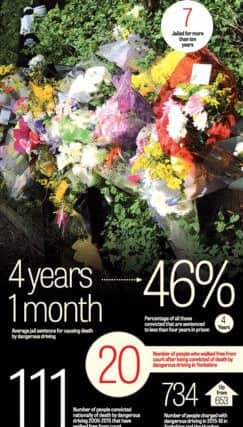'˜Feeling like murder': The killer drivers who simply walk free


Grief-stricken families expressing disappointment outside Britain’s courts following the sentencing of motorists whose reckless behaviour has claimed at least 800 lives since 2010 have become a familiar sight as the number of deaths on roads begins to rise once more.
But figures obtained from the Ministry of Justice and the Crown Prosecution Service can now lay bare the full extent of the disparities in the way the law and the criminal justice system is dealing with drivers, some of them under the influence of drink and drugs, who are responsible for deaths described by the bereaved as “feeling like murder”.
Advertisement
Hide AdAdvertisement
Hide AdWhile 255 people have been convicted of causing death by dangerous driving in Yorkshire in the past decade, less than a third, 74, were sentenced to more than five years in prison and 20 walked free from court altogether.


They were given suspended or community sentences and, in the case of three deaths, fined.
An investigation by The Yorkshire Post and its sister titles details for the first time what campaigners argue is the chronic leniency of the courts in dealing with killer drivers.
The findings will increase the pressure on the Government to revise sentencing rules for dangerous driving offences.
Advertisement
Hide AdAdvertisement
Hide AdAmong those calling for a change in the law is Major Richard Gilbey, who saw the killers of his son James, from Bramley, Leeds, given eight year jail sentences, of which they will serve just four years.


He told The Yorkshire Post: “They will walk away after nothing more than a short interlude in their lives. Yet they have destroyed ours.
“We are grateful for the Government’s ‘concerns’, but they mean nothing. Until the Government puts these concerns into action and changes the law, families like ours, and people like James, are continuing to lose their lives and the people responsible are virtually walking away.”
Data released under the Freedom of Information Act shows:
• In the 12 years since Parliament increased the longest sentence from ten to 14 years in jail, not a single person has been handed the maximum penalty for causing death by dangerous driving in England, Wales and Northern Ireland. In Scotland, publicly available statistics indicate that sentences have also fallen short of the maximum term.
Advertisement
Hide AdAdvertisement
Hide Ad• Of the 738 people convicted between 2010 and 2015 of the offence, the most serious driving crime on the statute book, just seven - or 0.9 per cent of the total - were jailed for more than ten years.
• The average jail sentence for causing death by dangerous driving is four years and one month, with 46 per cent of all those convicted sentenced to less than four years in prison.
• A total of 111 people convicted of death of death by dangerous driving between 2006 and 2015 have walked free from court. Of that total, 93 received suspended jail terms or community service.
In ten cases, the offender escaped with only a fine while three were given an absolute discharge - effectively a finding that the experience of prosecution was sufficient punishment.
Advertisement
Hide AdAdvertisement
Hide AdA long-delayed consultation on a review of sentencing in dangerous driving cases has been promised by ministers to begin by the end of the year.
But critics point out the review was first promised in 2014 and former Cabinet minister last night accused current ministers of “foot-dragging” over the issue, saying it was clear that the law and sentencing governing culpable deaths on Britain’s roads is “wholly inadequate”.
Campaigners are demanding a package of measures, including a root and branch review of sentencing guidelines for judges to ensure that tougher sentences are imposed in the most serious cases and the closure of loopholes which mean that it is in the interest of drink drivers involved in a fatal collision to flee the scene.
Under rules which apply to all criminals, a driver who pleads guilty before the case goes to trial will have their sentence automatically reduced by a third and most criminals will be released after serving half their sentence.
Advertisement
Hide AdAdvertisement
Hide AdThis means that some killer drivers could be out of jail in a matter of months.
Campaigners have said there is a now glaring need for politicians revisit the law.
Gary Rae, campaigns director at road safety charity Brake, said: “One of the issues is courts do not use the powers they have already got. People think road crime is viewed and a treated as a second rate crime. If your loved one was shot dead, everyone would say how horrific that was.
“But people are more accepting and complacent about road deaths. The law needs to change so sentencing fits the crime.”
Advertisement
Hide AdAdvertisement
Hide AdThe number of drivers charged with dangerous driving is rising. Last year saw an increase of 20 per cent to 5,940 in motorists facing the charge. But critics say those convicted are escaping too lightly.”
The Ministry of Justice declined to give a date for the launch of its consultation, repeating its assurance that it will do so by the end of the year.
In a statement, a spokesperson said: “This government is determined to make sure sentencing fits the crime for those who kill or seriously injure on our roads. That is why we will launch a consultation on dangerous driving offences and penalties by the end of the year.”